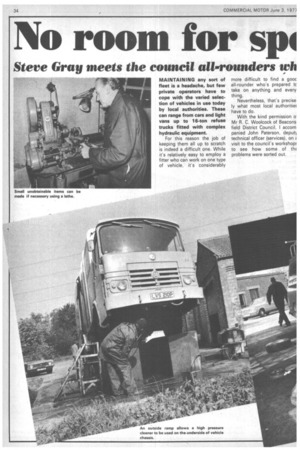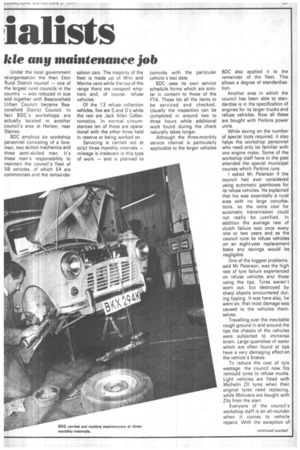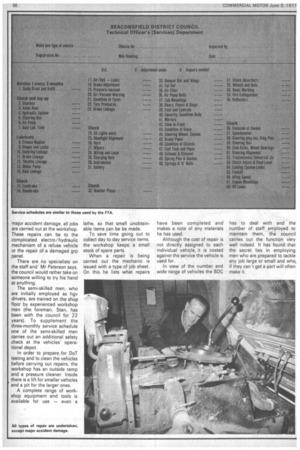MAINTAINING any sort of fleet is a headache, but few
Page 36

Page 37

Page 38

If you've noticed an error in this article please click here to report it so we can fix it.
private operators have to cope with the varied selection of vehicles in use today by local authorities. These can range from cars and light vans up to 16-ton refuse trucks fitted with complex hydraulic equipment.
For this reason the job of keeping them all up to scratch is indeed a difficult one. While its relatively easy to employ a fitter who can work on one type of vehicle, it's considerably more difficult to find a gooc all-rounder who's prepared tc take on anything and every thing.
Nevertheless, that's precise ly what most local authoritieE have to do.
With the kind permission Mr R. C. Woolcock of Beacons field District Council, I accom panied John Paterson, debut) technical officer (services), on E. visit to the council's workshop: to see how some of thE problems were sorted out. Under the local government re-organisation the then Eton Rural Distrcit council — one of the largest rural councils in the country — was reduced in size and together with Beaconsfield Urban Council became Beaconsfield District Council. In fact .BDC's workshops are actually located in another council's area at Horton, near Staines.
BDC employs six workshop personnel consisting of a foreman, two skilled mechanics and three semi-skilled men.. It's these men's responsibility to maintain the council's fleet of 58 vehicles, of which 54 are commercials and the remainder saloon cars. The majority of the fleet is made up of Mini and Marina vans while the top of the range there are cesspool emptiers and, of course, refuse vehicles.
Of the 13 refuse collection vehicles, five are S and D's while the rest are Jack Allen Collectomatics. In normal circumstances ten of these are operational with the other three held in reserve or being worked on.
Servicing is carried out at strict three monthly intervals — mileage is irrelevant in this type of work — and is planned to coincide with the particular vehicle's test date.
BDC uses its own service schedule forms which are similar in content to those of the FTA. These list all the items to be serviced and checked. Usually the inspection can be completed in around two to three hours while additional work found during the check naturally takes longer.
Although the three-monthly service interval is particularly applicable to the larger vehicles BDC also applied it to the remainder of the fleet. This allows a degree of standardisation.
Another area in which the council has been able to standardise is in the specification of engines for its larger trucks and refuse vehicles. Now all these are bought with Perkins power units.
While saving on the number of special tools required, it also helps the workshop personnel who need only be familiar with one engine make. Some of the workshop staff have in the past attended the special municipal courses which Perkins runs.
I asked Mr Paterson if the Council had ever considered using automatic gearboxes for its refuse vehicles. He explained that his was essentially a rural area with no large conurbations, so the extra cost for automatic transmission could not really be justified. In addition the average rate of clutch failure was once every one or two years and as the council runs its refuse vehicles ion an eight-year replacement ;basis any savings would be. negligible.
One of the biggest problems, said Mr Paterson, was the high rate of tyre failure experienced on refuse vehicles and those using the tips. Tyres weren't worn out, but destroyed by sharp objects encountered during tipping. It was here also, he went on, that most damage was caused to the vehicles themselves.
Travelling over the inevitable rough ground in and around the tips the chassis of the vehicles were subjected tO immense strain. Large quantities of water which are often found at tips have a very damaging effect on the vehicle's brakes.
To reduce the cost of tyre wastage, the council now fits remould tyres to refuse trucks. Light vehicles are fitted with Michelin ZX tyres when their original tyres need replacing, while Minivans are bought with ZXs from the start.
Everyone of the council's workshop staff is an all-rounder when it comes to vehicle, repairs. With the exception of major accident damage, all jobs are carried out at the workshop. These repairs can be to the complicated electro/ hydraulic mechanism of a refuse vehicle or the repair of a damaged grp panel.
There are no specialists on the staff and Mr Paterson says, the council would rather take on someone willing to try his hand at anything.
The semi-skilled men, who are initially employed as hgv drivers, are trained on the shop floor by experienced workshop men (the foreman, Stan, has been with the council for 22 years). To supplement the three-monthly service schedule one of the semi-skilled men carries out an additional safety check at the vehicles' operational depot.
In order to prepare for DoT testing and to clean the vehicles before carrying out repairs, the workshop has an outside ramp and a pressure cleaner. Inside there is a lift for smaller vehicles and a pit for the larger ones.
A complete range of workshop equipment and tools is available for use -even a lathe, so that small unobtainable items can be be made.
To save time going out to collect day to day service items, the workshop keeps a small stock of spare parts.
When a repair is being carried out the mechanic is issued with a type of job sheet. On this he lists what repairs have been completed and makes a note of any materials he has used.
Although the cost of repair is not directly assigned to each individual vehicle, it is costed against the service the vehicle is used for.
In view of the number and wide range of vehicles the BDC has to deal with and the number of staff employed to maintain them, the council carries out the function very well indeed. It has found that the secret lies in employing men who are prepared to tackle any job large or small and who, if they can't get a part will often make it.




















































































































